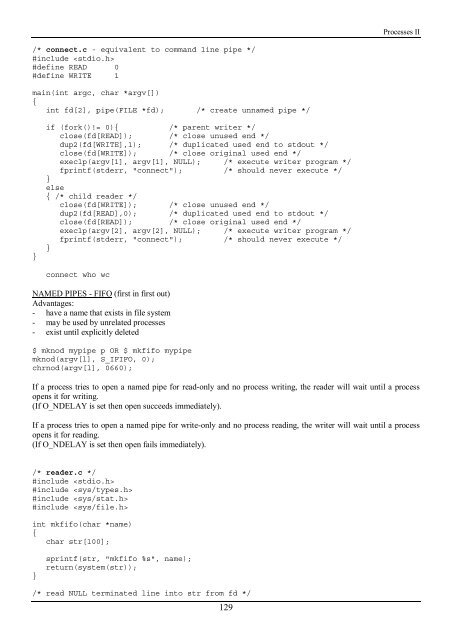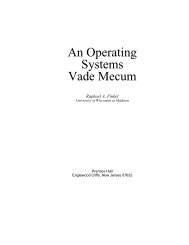You also want an ePaper? Increase the reach of your titles
YUMPU automatically turns print PDFs into web optimized ePapers that Google loves.
Processes II<br />
/* connect.c - equivalent to command line pipe */<br />
#include <br />
#define READ 0<br />
#define WRITE 1<br />
main(int argc, char *argv[])<br />
{<br />
int fd[2], pipe(FILE *fd); /* create unnamed pipe */<br />
}<br />
if (fork()!= 0){ /* parent writer */<br />
close(fd[READ]); /* close unused end */<br />
dup2(fd[WRITE],1); /* duplicated used end to stdout */<br />
close(fd[WRITE]); /* close original used end */<br />
execlp(argv[1], argv[1], NULL); /* execute writer program */<br />
fprintf(stderr, "connect"); /* should never execute */<br />
}<br />
else<br />
{ /* child reader */<br />
close(fd[WRITE]); /* close unused end */<br />
dup2(fd[READ],0); /* duplicated used end to stdout */<br />
close(fd[READ]); /* close original used end */<br />
execlp(argv[2], argv[2], NULL); /* execute writer program */<br />
fprintf(stderr, "connect"); /* should never execute */<br />
}<br />
connect who wc<br />
NAMED PIPES - FIFO (first in first out)<br />
Advantages:<br />
- have a name that exists in file system<br />
- may be used by unrelated processes<br />
- exist until explicitly deleted<br />
$ mknod mypipe p OR $ mkfifo mypipe<br />
mknod(argv[l], S_IFIFO, 0);<br />
chrnod(argv[l], 0660);<br />
If a process tries to open a named pipe for read-only and no process writing, <strong>the</strong> reader will wait until a process<br />
opens it for writing.<br />
(If O_NDELAY is set <strong>the</strong>n open succeeds immediately).<br />
If a process tries to open a named pipe for write-only and no process reading, <strong>the</strong> writer will wait until a process<br />
opens it for reading.<br />
(If O_NDELAY is set <strong>the</strong>n open fails immediately).<br />
/* reader.c */<br />
#include <br />
#include <br />
#include <br />
#include <br />
int mkfifo(char *name)<br />
{<br />
char str[100];<br />
}<br />
sprintf(str, "mkfifo %s", name);<br />
return(system(str));<br />
/* read NULL terminated line into str from fd */<br />
129
















